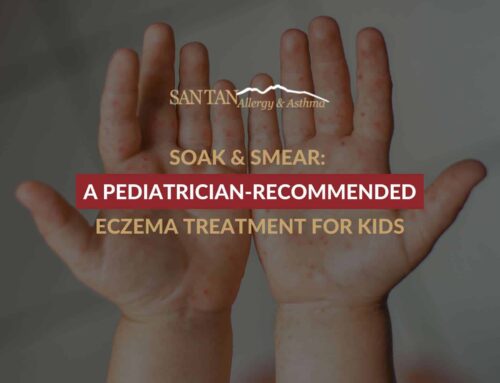Preventing Long-Term Asthma Damage To Your Health
Millions of Americans, both children and adults suffer from asthma. This common medical condition occurs when a person’s airways become narrow, swollen, and inflamed, making it difficult for the person to breathe.
When not managed well, asthma can cause permanent damage to your lungs. As the inner lining of your respiratory tubes become repeatedly inflamed, the smooth muscles will gradually tighten, resulting in irreversible damage such as narrowed airways and reduced air supply to your lungs. This can lead to a decreased ability to filter air pollutants and bronchial muscle spasms, both of which will further compromise lung function.
If you suspect you or your child has asthma, see your allergist for Chandler asthma testing and a treatment plan.

What Is Asthma?
Asthma is a medical condition in which the respiratory tract – the trachea and bronchial tubes – overreact to elements of the environment. Common triggers for asthma attacks include:
- Pollens
- Dust
- Mold
- Pet hair or dander
- Smoke from fires or tobacco
- Aerosols
- Flu, cold, and other infections
- Hyperventilation or panic attacks
During an asthma attack, the mucus membranes become inflamed and swollen. They begin to produce thick and excessive mucus that can be very difficult to expel from the body. Once the smooth muscles around the airway begin to tighten, the bronchial tubes can spasm, further constricting the airway.
Asthma symptoms include:
- Difficulty breathing and shortness of breath
- Coughing, especially at night
- Wheezing, a whistling sound while breathing
- Pain, pressure, or tightness in the chest
- Secondary symptoms include anxiety, social challenges, and difficulty sleeping due to the struggle to breathe
A Queen Creek asthma doctor can help you manage asthma triggers, find an effective treatment plan to reduce your symptoms, and reduce the frequency of asthma attacks.
What Are The Long-Term Effects of Asthma?
Over time, chronic inflammation and repeated bronchospasms can lead to structural changes in the airway, causing permanent narrowing, scarring, and thickening. The bronchial muscle can enlarge, creating reduced lung function and difficulty breathing.
Additionally, asthma increases a person’s risk of getting bronchial infections and may result in poorer outcomes. Poor sleep quality and sleep deprivation are common among asthma patients. Asthma patients may struggle to exercise or participate in sports, which can lead to an increased risk of diabetes, obesity, high blood pressure, social difficulties, and other complications.
In rare cases, severe asthma attacks increase the risk of respiratory failure and can even lead to death. However, with asthma treatment, asthma attacks can be managed to optimize health.
Will Asthma Worsen As I Get Older?
As we age, our lungs become less elastic, our chest walls become more rigid, and our respiratory muscles become less efficient. All of these factors can aggravate asthma symptoms. Unfortunately, physiological changes that naturally occur as we age can make some asthma treatments less effective, and common coexisting health conditions in older people can complicate asthma diagnosis and treatment. That’s why it’s important to see an asthma doctor at the earliest to relieve asthma attacks and prevent long-term damage as much as possible.
Can Asthma Be Cured?
Although asthma is chronic and incurable, medicine has come a long way in recent decades, and there are many treatment options that can effectively manage asthma. These include medications and lifestyle changes. With careful treatment from your Mesa allergy doctor, it’s possible to reduce airway inflammation, relieve spasms, and prevent permanent damage.
Treatment can significantly reduce both the intensity and frequency of asthma attacks so most patients can live a normal life with athletic activity.
What Happens If I Don’t Treat My Asthma Symptoms?
Some types of untreated asthma are likely to become progressively worse, resulting in long-term complications and serious damage to the respiratory system. Other types of childhood asthma will eventually improve; in fact, about 50% of children will “grow out” of their asthma. Since it’s impossible to predict who might or might not continue to struggle with asthma in adulthood, and because childhood asthma attacks can be frightening for both children and parents, it’s best to treat asthma at the earliest symptoms.
Although some asthma patients get used to mild challenges with breathing and largely ignore their condition, it’s important to remember that persistent asthma is likely to become worse over time. Maintenance medications and avoidance of triggers can be helpful for most patients. Asthma typically flares up in acute episodes that result from exposure to triggers but may stay dormant for many months at a time. However, the absence of obvious symptoms does not mean that the disease is gone or that inflammation is not present.
How Can I Prevent Long Term Damage From Asthma?
Although it’s not possible to completely prevent asthma attacks, asthma treatment can help protect your lungs from damage. Your doctor can make personalized recommendations, which may include:
- Identifying and avoiding attack triggers
- Avoiding smoking and secondhand smoke, including vaping
- Staying as active as possible to strengthen your lungs
- Learning to identify early attack symptoms and forming a response plan
- Regular doctor visits to assess lung function
Visit Chandler’s Leading Provider of Asthma Care
San Tan Allergy and Asthma is one of the top rated asthma care providers in the Phoenix area. With cutting edge technology, we are able to provide comprehensive testing, treatment, and condition management that is individualized for each patient at our clinic. Our compassionate providers can guide you toward a full understanding of your medical conditions and provide options that help you lead a full and healthy life. Give us a call to schedule your appointment today!

San Tan Allergy & Asthma
4915 E Baseline Rd #112
Gilbert, AZ 85234
Phone: 480-626-6600
Email: officemanager@santanallergy.com
Website: https://santanallergy.com/







